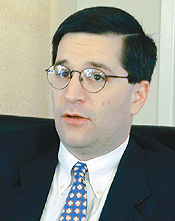Nober: New Hours Rules Uncertain
 | |
| More coverage | |
| |
 |
The Department of Transportation “has come up with a proposal, but [the committee hasn’t] seen what it is, and we don’t know what it is,” Nober said.
“I wouldn’t expect that it is one that will improve productivity, given the views that are out there of the people writing it,” he continued. Hours of service “is one [issue] where you will see the intersection of science, of medicine, of politics, of emotions. It is a very, very difficult issue to deal with in a comprehensive and sensible manner. So I don’t know what will happen.”
The proposed rule, according to industry sources, would mandate a 14-10 schedule — 14 hours on-duty (with no distinction between driving and other work, such as loading and unloading) and 10 hours off, based on a 24-hour clock, with two hours of break time per on-duty shift.
 |  Michael James - Transport Topics |
 | House Transportation Committee General Counsel Roger Nober |
Describing the difficulty of getting a “science-based” rule put in place, Nober referred several times to the “emotionalism” that some parties bring to legislative and regulatory issues related to trucking. He was referring primarily to safety advocacy groups such as Public Citizen, Advocates for Highway and Auto Safety, and Citizens for Reliable and Safe Highways, whose clout on Capitol Hill is considerable and who have fought hard to keep driver hours from increasing.
American Trucking Associations President Walter B. McCormick Jr. told forum participants that “there is no more important thing that the government can do for safety than to have fundamental science-based reform of hours of service.”
Ultimately, however, Nober hinted that there are real limits to how Congress will be able to alter the hours of service.
 |
For the full story, see the Jan. 17 print edition of Transport Topics. Subscribe today.

